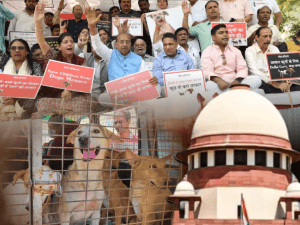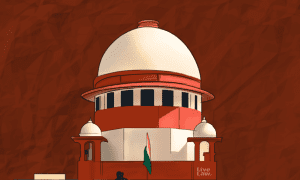New Delhi – The Delhi Dog Verdict delivered by the Supreme Court on Friday marked a dramatic reversal of the earlier controversial August 11 order, bringing relief to thousands of animal lovers who had challenged the original directive. The landmark Delhi Dog Verdict modified the harsh provisions that would have permanently relocated stray dogs from Delhi-NCR, instead allowing their release after sterilization and vaccination.
Supreme Court Stays Earlier Order

The Delhi Dog Verdict effectively stayed the August 11 order that had directed the picking up and relocation of all stray dogs from Delhi-NCR within eight weeks. The three-judge special bench headed by Justice Vikram Nath acknowledged that the previous directive was “too harsh” and needed modification to balance animal welfare with public safety concerns.
The court’s Delhi Dog Verdict clarified that while stray dogs would still be picked up by municipal authorities, they must be released back to their original locations after undergoing sterilization and immunization procedures. This represents a significant victory for animal welfare advocates who had argued that permanent relocation would be both impractical and inhumane.
Key Provisions of the Delhi Dog Verdict


The Delhi Dog Verdict established several important guidelines for handling stray dogs in the capital region. Dogs infected with rabies or exhibiting aggressive behavior would continue to be kept in shelters and not released back to the streets. However, healthy dogs that pose no threat to public safety must be returned to their territories after medical treatment.
The court emphasized that the Delhi Dog Verdict applies not only to Delhi-NCR but extends to similar cases pending in courts across all states. This nationwide approach ensures consistent treatment of stray dog issues throughout the country, preventing conflicting orders from different jurisdictions.
Feeding Restrictions and Dedicated Stations


A crucial aspect of the Delhi Dog Verdict addressed the contentious issue of street feeding. The Supreme Court ruled that feeding stray dogs on public streets would no longer be permitted under any circumstances. Instead, municipal authorities must create dedicated feeding stations to ensure proper nutrition while maintaining public hygiene and safety.
The Delhi Dog Verdict specified that factors such as population density and concentration of stray dogs in particular municipal wards should guide the establishment of these feeding stations. Those found violating the street feeding ban would face legal action under relevant frameworks.
Financial Responsibilities and Infrastructure
The Delhi Dog Verdict also addressed funding concerns for implementing the new directives. Animal activists and NGOs that had approached the court were directed to contribute financially toward shelter construction. Individual dog lovers must pay ₹25,000 while NGOs are required to contribute ₹2 lakh for building adequate shelter infrastructure.
The court recognized in the Delhi Dog Verdict that a blanket direction to place all strays in shelters without evaluating existing infrastructure would create an impossible situation. This pragmatic approach acknowledges the limitations of current facilities while working toward sustainable solutions.
Political and Public Reactions


The Delhi Dog Verdict received widespread political support across party lines. Congress leader Rahul Gandhi welcomed the decision as “progressive” and “rooted in scientific reasoning,” emphasizing the balance between animal welfare and public safety. Delhi Mayor Raja Iqbal Singh praised the ruling, stating that the corporation would implement it completely.
Animal rights activist and BJP leader Maneka Gandhi called the Delhi Dog Verdict a “scientific judgment,” noting that relocation and fear are primary causes of dog aggression. She particularly welcomed the directive for creating designated feeding areas while suggesting the court should define what constitutes an aggressive dog more clearly.
Celebrations and Relief

Animal lovers gathered at Jantar Mantar to celebrate the Delhi Dog Verdict, expressing relief that the Supreme Court had upheld constitutional rights for all living beings. The modification of the harsh August 11 order was seen as a victory for compassionate governance and scientific animal management practices.
Petitioner Nanita Sharma described the Delhi Dog Verdict as a “balanced order” that addresses concerns of all stakeholders while ensuring proper treatment of stray animals. Dog shelter operator Sonali Gaba expressed happiness that the court ruled in favor of creating designated feeding areas rather than complete street feeding bans.
Implementation Timeline and Future Steps
The Supreme Court listed the matter for hearing again after eight weeks, indicating ongoing monitoring of implementation progress. The Delhi Dog Verdict requires immediate action from municipal corporations to begin sterilization programs and establish feeding stations while ensuring compliance with new guidelines.
Municipal authorities must now develop comprehensive strategies for identifying aggressive dogs, creating adequate shelter facilities, and establishing feeding stations based on local population dynamics. The success of the Delhi Dog Verdict will depend on effective coordination between government agencies, NGOs, and animal welfare organizations.
Long-term Impact on Animal Welfare
The Delhi Dog Verdict represents a significant evolution in India’s approach to stray animal management, moving from punitive relocation to scientific population control through sterilization. This landmark judgment sets important precedents for other states facing similar challenges with stray dog populations.
The verdict demonstrates that courts can balance competing interests through evidence-based solutions that protect both animal welfare and public safety, creating a framework for sustainable coexistence in urban environments.

